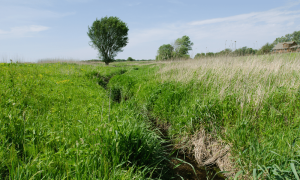IARN — As we are coming off another year of drought in Iowa, I find it interesting to think about water as much as I have in the past day or two. It’s an interesting situation. I recently saw a TikTok video that featured Dr. Neil deGrasse Tyson talking about the desalinization of the oceans for drinking water. He said that right now we have the technology, but it’s the cost that prohibits it. The sarcastic sentence was, “it’s only money.” However, someday that will not be the case, and wars will likely be fought over who has control of water supplies.
I liken that back to something I heard my uncle say. He said eventually people will pay money to have water. I couldn’t fathom that. This was at a time when bottled water wasn’t being marketed very much, if at all. The only bottled water you would see was for the “water cooler”. If I wanted a drink, I could go to any one of three buildings on our farm that had access to our well and get a drink. I would never think about paying to buy water in bottles.
This change is happening in the span of just 40 years. 40 years on this planet, is like trying to find a pimple on a flea. There’s no significance to that short amount of time. Yet, in that time, humans have found more ways to use – and let’s just be frank about it – waste our supply of water and are doing so at an alarming rate. Agriculture is not innocent of blame in this situation by any means. We are also not the worst culprit, but we seem to be an easy target, because we are a direct user of water in its natural form, right from the tap of Mother Nature.
Brian Richter is the President of Sustainable Waters. During a recent appearance at the Professional Dairy Producers Dairy Insight Summit, he talked about the impact water shortages will have on agriculture.
For more on this story visit the Iowa Agribusiness Radio Network.
Photo by Iowa Soybean Association











